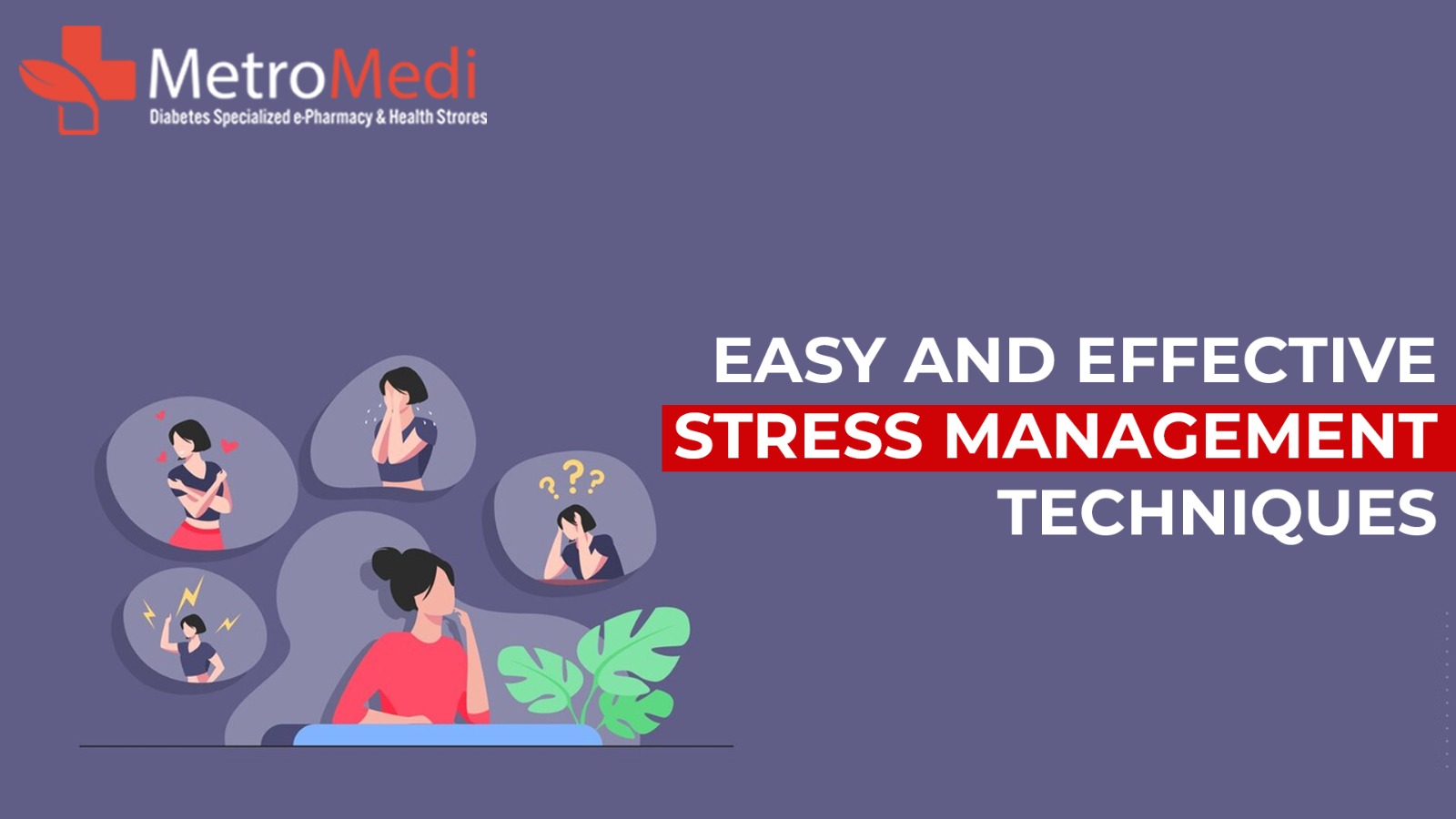Easy and Effective Stress Management Techniques
Introduction :Stress Management Techniques
In today’s fast-paced world, stress has become an inevitable part of our lives. Whether it’s due to work pressures, personal challenges, or the demands of daily life, stress can take a toll on both our physical and mental well-being. However, the good news is that there are easy and effective stress management techniques that can help you navigate through life’s challenges with greater ease. In this blog, we’ll explore a variety of techniques that are not only simple to incorporate into your routine but also proven to be effective in promoting a calmer and more balanced life.

Understanding Stress
Before diving into the stress management techniques, it’s essential to understand what stress is and how it affects our bodies. Stress is the body’s natural response to any demand or challenge. While short-term stress can be beneficial and even motivating, chronic stress can have detrimental effects on both physical and mental health. It’s crucial to recognize the signs of stress, such as increased heart rate, muscle tension, and changes in mood, to address it proactively.
- Mindfulness Meditation
Technique: Mindfulness meditation involves focusing on the present moment without judgment. It can be practiced through various methods, such as guided meditation, mindful breathing, or body scan exercises.
Benefits: Mindfulness meditation has been scientifically proven to reduce stress levels by promoting relaxation and helping individuals cultivate a non-reactive awareness of their thoughts and emotions.
How to Incorporate: Start with just a few minutes of mindfulness meditation each day. Gradually increase the duration as you become more comfortable with the practice. Apps like Headspace and Calm can be helpful for beginners.
- Deep Breathing Exercises
Technique: Deep breathing exercises involve taking slow, deep breaths to activate the body’s relaxation response. Techniques such as diaphragmatic breathing and box breathing are effective in calming the nervous system.
Benefits: Deep breathing helps reduce the physiological symptoms of stress, such as elevated heart rate and shallow breathing. It promotes a sense of calm and relaxation.
How to Incorporate: Set aside a few minutes each day for deep breathing exercises. Practice in a quiet, comfortable space, focusing on inhaling and exhaling slowly and deeply.
- Regular Exercise
Technique: Engaging in regular physical activity, whether it’s walking, jogging, yoga, or any other form of exercise, is a powerful way to manage stress.
Benefits: Exercise releases endorphins, the body’s natural stress relievers. It also helps improve mood, enhance sleep quality, and reduce muscle tension, all of which contribute to stress reduction.
How to Incorporate: Find an exercise routine that you enjoy and can sustain. Aim for at least 30 minutes of moderate-intensity exercise most days of the week.
- Time Management
Technique: Efficiently managing your time and priorities can significantly reduce stress. Break tasks into smaller, manageable steps and create a realistic schedule.
Benefits: By organizing your time effectively, you can avoid feeling overwhelmed and create a sense of accomplishment, contributing to reduced stress levels.
How to Incorporate: Use tools like planners, calendars, or time management apps to schedule tasks and allocate time for breaks and self-care.
- Positive Affirmations
Technique: Positive affirmations involve repeating positive statements to oneself, fostering a positive mindset and reducing negative thoughts.
Benefits: Affirmations can shift your focus from stress-inducing thoughts to more empowering and positive ones, ultimately improving your overall mental well-being.
How to Incorporate: Create a list of positive affirmations that resonate with you. Repeat them daily, especially during challenging moments.
- Adequate Sleep
Technique: Prioritize getting enough quality sleep by establishing a consistent sleep routine and creating a sleep-conducive environment.
Benefits: Sleep is crucial for overall well-being, and a lack of it can exacerbate stress. Quality sleep enhances mood, cognitive function, and resilience to stressors.
How to Incorporate: Aim for 7-9 hours of sleep each night. Create a relaxing bedtime routine and ensure your sleep environment is comfortable and conducive to rest.
- Social Connections
Technique: Cultivate and nurture positive social connections. Spend time with friends and family, and build a support system.
Benefits: Social connections provide emotional support and a sense of belonging, reducing feelings of isolation and stress.
How to Incorporate: Make an effort to connect with loved ones regularly, whether through phone calls, video chats, or in-person meetings.
- Hobbies and Leisure Activities
Technique: Engaging in activities you enjoy and that bring you a sense of fulfillment can be a powerful stress management tool.
Benefits: Hobbies and leisure activities provide a break from daily stressors, promoting relaxation and a positive state of mind.
How to Incorporate: Set aside time for activities you love, whether it’s reading, gardening, painting, or any other hobby.
Conclusion : Stress Management Techniques
Incorporating these easy and effective stress management techniques into your daily routine can make a significant difference in your overall well-being. Remember that everyone is unique, so it may take some trial and error to find the combination of techniques that works best for you. The key is to be consistent and patient as you integrate these practices into your lifestyle. By taking proactive steps to manage stress, you can cultivate a calmer and more balanced life, improving both your physical and mental health.
Best Hair Oil and Vitamin Capsules for Nourish and Restore Your Hair Naturally
